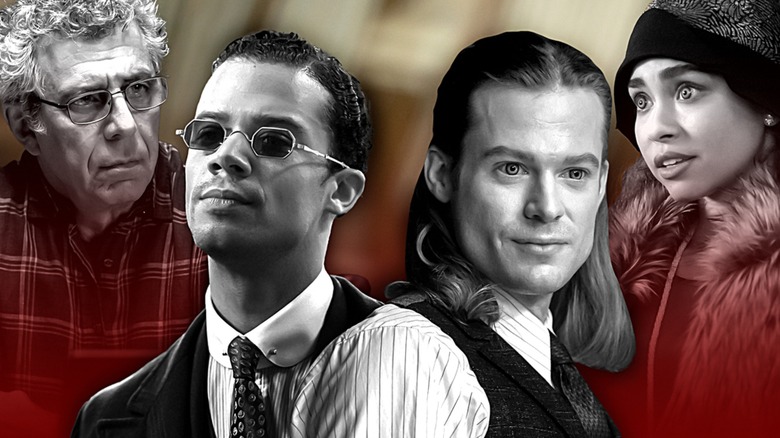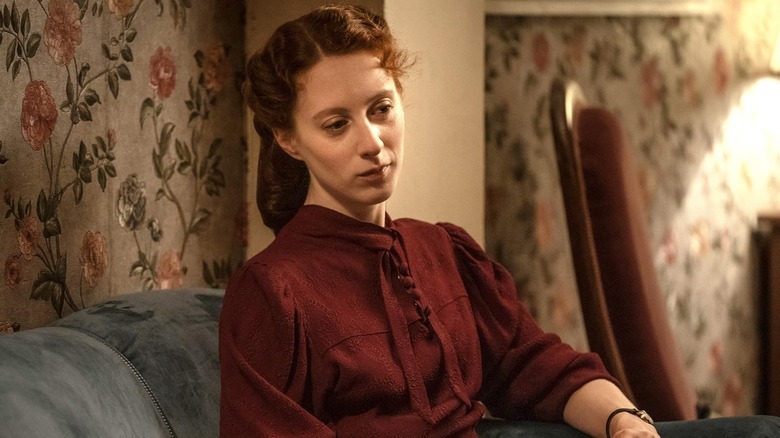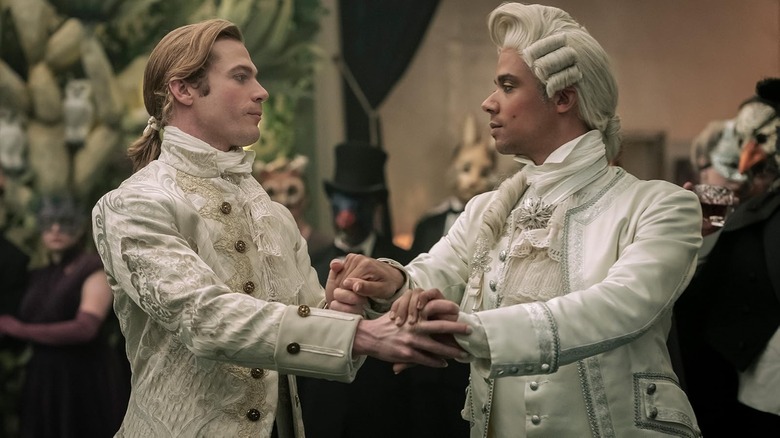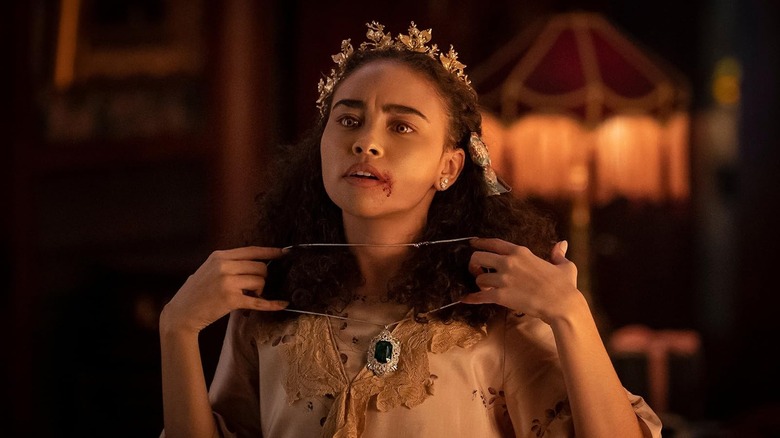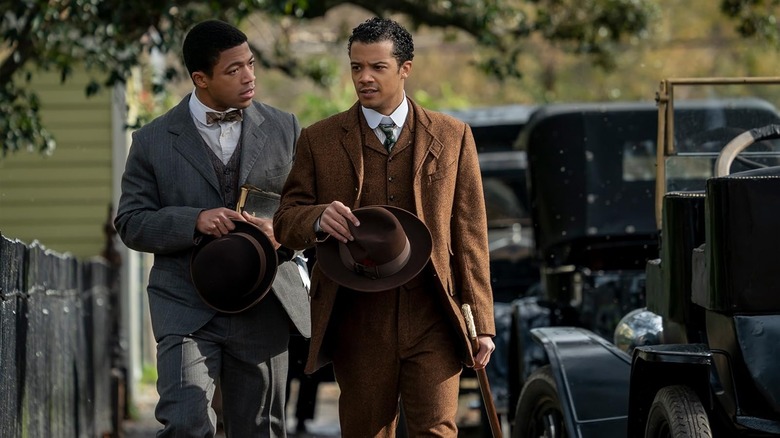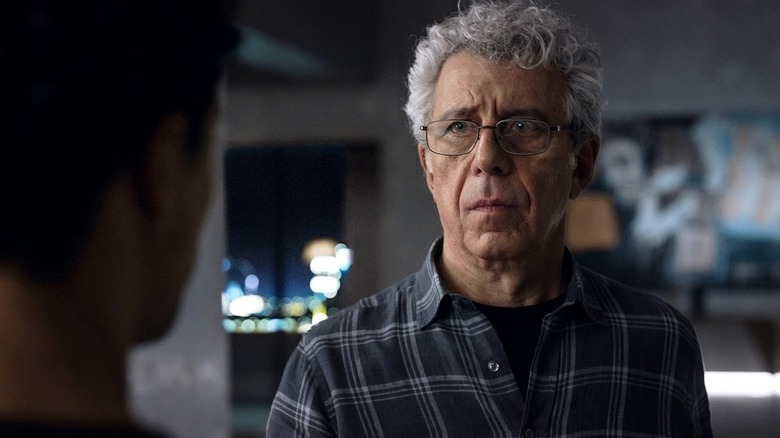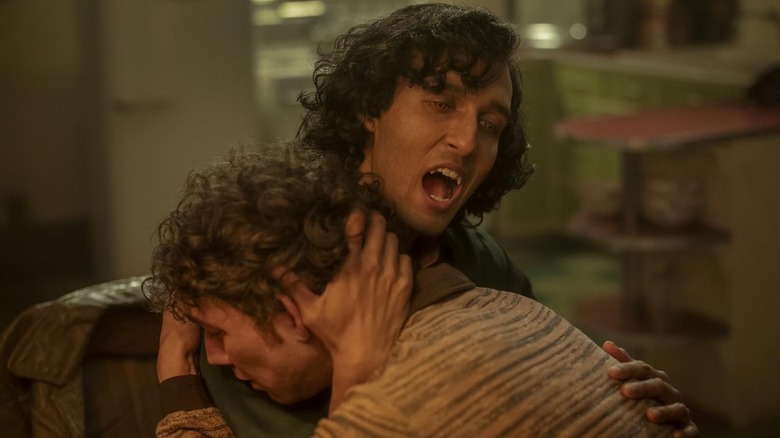The Best Episodes Of Interview With The Vampire (So Far), Ranked
To date, there's no such thing as a bad episode of "Interview with the Vampire." Rolin Jones' AMC adaptation of Anne Rice's famed vampire novels has so far pulled off an astonishing balancing act for 15 episodes and counting. The show is a beautiful collision of modes of drama that shouldn't work on TV, including but not limited to rich, ornate dialogue, dark humor and camp, and painfully poignant tragedy. It's decadent, gothic, and melodramatic, yet it constantly presents deep-seated, timeless truths about family, identity, and the search for self.
The show also works with human memory in a way few others have before it, building its first two seasons out of a house of the flimsiest of paper cards –- the biased, editorialized, corrupted memories of Louis de Pointe du Lac (Jacob Anderson), his dead daughter Claudia (Bailey Bass and Delainey Hayles), and his enigmatic boyfriend Armand (Assad Zaman). The house eventually comes tumbling down –- literally and figuratively –- by the show's heartbreaking season 2 climax, but fans eagerly await yet another angle to the vampires' stories; one that will take the shape of a rock documentary focused on savage diva Lestat de Lioncourt (Sam Reid).
If "Interview with the Vampire" continues dropping new installments with the same level of artistry and execution as the first two, this list will look entirely different within a year or so. In the meantime, though, here are six episodes of the bloody good series that we'd rank just a hair or two above the rest.
6. Like The Light By Which God Made The World Before He Made Light
The last four episodes of "Interview with the Vampire" season 2 build up a powerful momentum, elevating the stakes of the story and radically readjusting its frame narrative over and over again. Moments Louis has been hinting at and talking around for over a full season finally take shape, and as horrific as they are, they're also impossible to look away from. Among the toughest to bear? The kidnapping of Louis, Claudia (Hayles), and Madeleine (Roxane Duran) on Armand's orders, and the tortured lead-up to the singularly idyllic family moment that came before it.
"Like the Light" picks up right after the show's game-changing flashback episode revealed the first hint of Armand's control over Louis, and the pair's dysfunction plays out in the background of continued descriptions of their time in Paris. As Louis seethes and Armand feigns calm, viewers are finally clued into the incident that would have been Claudia's happily ever after in another life: the creation of Madeleine. Every moral and philosophical argument the show has ever made about immortality comes to the forefront again as the pair argue about turning Claudia's dressmaker companion into a vampire, but in the end, Louis does it.
The episode is remarkable for both its tension build and its misdirection. Viewers are so focused on the present-day discord between Louis and Armand that those who haven't read the book are caught off-guard by the hour's final moments, in which a blissful dinner is interrupted by the Théâtre des Vampires and Lestat is revealed to be alive, waiting in the wings. It's at once a shriek-worthy development and a painful one, as the show counters Lestat's delightful bitchy presence with an unavoidable sense of impending doom. This was the last time Louis and Claudia would ever be a happy family.
5. The Thing Lay Still
By the time "Interview with the Vampire" season 1 came to an end, its many silky threads of drama seemed like they could never be tied together. The relationships were too thorny and complex, the retrospective point of view too blurred by time and emotion for anything to ever conclude neatly. But this isn't an ordinary show, and the writers, actors, and craftspeople working behind the scenes rose to the occasion to make the season 1 sendoff as dramatic and double-edged as possible. Even knowing how the saga ended in Anne Rices' books still did nothing to prepare viewers for what was to come in this upgraded take on the attempted murder of Lestat.
The episode opens with the central trio in a place of deep unease, as Claudia wants Lestat dead and Louis has come to see him as an incurable yet seductive abuser. Claudia hatches a plan to play into his knack for indulgence, scripting his death by surrounding it with the heady delights of an extravagant Mardi Gras ball turned bloodbath. This episode is funny at times, especially when ill-fated locals who are morbidly curious about their gay, immortal neighbors end up dazzled by their last hurrah. It's also achingly romantic, anchored by a scene in which Louis and Lestat, drawn together despite their toxic past, share a kiss on the dance floor in front of people who they know won't live long enough to judge them for it.
"The Thing Lay Still" rewards rewatches, especially in the wake of Claudia's loneliness in season 2 and Lestat's reframing of his and Louis' relationship. Small details like the way Louis holds Lestat as he dies, or Daniel's (Eric Bogosian) quick observation that Louis saved Lestat's life by sending him to the dump, hit even harder the second time around. So does the episode's cheeky final reveal — that the docile yet protective servant stalking around the background of season 1 was actually Armand all along.
4. The Ruthless Pursuit of Blood With All A Child's Demanding
Claudia's introduction episode is one of the first real signs that this show is capable of doing pretty much anything. The addition of a peppy, childish Southern girl to the series' serious-as-the-grave central dynamic shouldn't work, but it does. Claudia proves that Louis and Lestat are capable of being much more than monsters, and they actually come across as pretty great dads in this episode. Like others on this list, it's an hour that holds up well upon rewatch, as the show's writers deliberately spend plenty of screen time focusing on the highlights of Claudia's first years in the family –- knowing full well that joyful moments will soon be few and far between.
"The Ruthless Pursuit of Blood" also works as a nearly standalone coming-of-age story, one in which Claudia is turned into a vampire as a teenager and adapts quickly to the inherent bloodthirstiness of her new status. She's less receptive to the idea of being perpetually seen as a kid, though, and the episode takes a dark (and darkly comic, thanks to Bass' chipper performance) turn when she attempts to refashion herself as an adult in pursuit of a partner. Her attempt to pass as a human with her first lover Charlie fail miserably, and the episode's end marks yet another turn for the series as Lestat forces her to watch his burning body in a sort of sadistic fatherly lesson.
The series' fourth episode isn't just pivotal on a narrative level, but also a tonal one. Thanks to Claudia's teen girl take on her parents, it's among the first to balance outright humor with its drama and gore, and it's surprisingly delicate in its approach to the new character's journey toward self-understanding. Claudia's narrative voice injects new energy into the series, but the episode also includes moments shot through with a grim sense of the future –- like when the episode ends with her purposely burning her arm in the light of day.
3. In Throes of Increasing Wonder
If you watch closely, everything that makes "Interview with the Vampire" one of the best shows on TV is there from the very beginning. The show's gorgeous, Alan Taylor-directed pilot contains a sneak preview of every feeling –- the terror and yearning, the pain and rage, the tragedy and joy, the comedy and sadism –- that will permeate the rest of the first two seasons. Episode 1 does this entirely through the perspective of Louis, who viewers (and snarky journalist Daniel Molloy) meet when he's a brothel owner in 1910.
Right off the bat, the show makes key changes that elevate its source material, doing away with the book's plantation setting and reimagining Louis as a Black man navigating a world of powerful white people. It also immediately makes it clear that this adaptation, unlike the 1994 film, won't beat around the bush when it comes to the established queerness of Louis and Lestat's story. Louis' status as a provider for his family, a Black man, and a closeted queer man all inform his sense of self, which is thrown into sharp relief when he encounters the mysterious Frenchman who will soon take over his life.
"In Throes of Increasing Wonder" moves impressively fast, establishing the pair's sexual relationship before adding in the shock of Louis's brother's suicide. By episode's end, the man is a wreck, turning to confession to deliver the first of several Jacob Anderson monologues that deserves to be studied in acting schools. The episode would've been phenomenal even if it ended on his broken declaration that he "laid down with the devil and he has his roots in me," but of course, it didn't. Lestat also showed up, punched a hole through a priest's head, and turned Louis into a vampire in an act of bloody passion. It's excessive, disturbing, and beautiful –- or as fans of The Vampire Chronicles would call it, perfect.
2. And That's The End of It. There's Nothing Else
Does any reveal in "Interview with the Vampire" taste sweeter than Daniel Molloy's eleventh-hour declaration that it was Lestat, not Armand, who saved Louis from death in Paris? Maybe the later revelation of Daniel's own vampiric nature, or the firm switch from past to present perspective, or the shock that came with audiences' realization that they were meeting the real Lestat for the first time in a run-down house in New Orleans. The show' second season finale is so full of exhilarating, rewarding moments that it's nearly impossible to single out just one.
If we had to, though, it would probably be the Armand reveal. The show goes off book for this twist, but lays clues to Armand's knack for mind-f**kery as far back as season 1, all the while expertly diverting our attention so we're focused only on what the show's writers want us to see at any given moment. For the first half of this episode, that's still Louis' story, a tale of detached vengeance in which he massacres almost all of the Théâtre des Vampires as payback for the killing of Claudia. Louis pours gasoline over caskets and lops the head off of Santiago (Ben Daniels), and as he does, the show takes on an unusually cinematic shine. It's part noir and part Tarantino, with the jazzy score and cutting action to match.
This is "Interview with the Vampire" letting us know that something is wrong with this story seconds before Daniel does. The way Louis remembers the night of the trial isn't just heightened, but false. The show has asked us to adjust our understanding of its subjective narrative before, but never so wholly, nor with as much at stake. By episode's end, Armand is in the wind, while his fledgling Daniel has just outed vampires to the world. Louis has told his story, and he's made peace with Lestat in a stunningly vulnerable scene that reframes the brat prince as a lost soul for the first time. "And That's the End of It" is a breathless achievement in storytelling and filmmaking, one that leaves fans both satisfied and desperate for more.
1. Don't Be Afraid, Just Start The Tape
Before Daniel Malloy was the curmudgeonly, hard-hitting reporter interviewing Louis in 2022, he was a strung out newbie following the vampire back to his apartment back in 1973. "Don't Be Afraid, Just Start the Tape" is a lore drop of epic proportions, an episode that unveils (nearly) the full extent of Daniel's prior involvement with the vamps, reveals Armand as an impressively f**ked-up and pathologically un-self-aware manipulator, and fills in a depressing key piece of the puzzle that is Louis and Lestat's century-long relationship (while also telling us that Louis was, at one point, a gay serial killer for good measure).
The episode also raises the stakes for the show as a whole, forcing viewers to get comfortable with the idea that no point-of-view we've witnessed is wholly trustworthy, no relationship is as it seems, and no one in this world will ever emerge morally unscathed. Luke Brandon Field holds his own against Anderson and a never-better Zaman as the scuzzy, ethically flexible young Daniel, who ends up becoming both a sounding board and a punching bag for the fighting couple. Over the course of his first "interview," he's held hostage, tortured, used as the world's least willing therapist, and eventually hypnotized to forget all about his brush with death.
Until this point, Daniel had been a sarcastic tour guide figure in the world of "Interview with the Vampire," but the episode reveals him as a major player –- whether he knows it or not –- in an immortal love triangle. It also gives Anderson and Zaman room to play, as they do when Louis delivers an incredibly catty monologue ("suffocation by the world's softest, beigist pillow!") in the middle of a fight Armand started after tolerating decades of Louis' moping ("Lestat! Lestat! Lestat! Lestat!"). Eventually, their psychological brawl gives way to something even darker. Surprising, stylish, and bleak, this episode is the missing piece to Louis' entire story, and the brutal emotional centerpiece of his life after Claudia.
